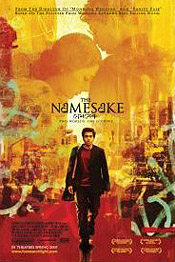 Kal Penn ('The Namesake')
Kal Penn ('The Namesake')
'Harold's Penn Pal'
Born and raised in New Jersey, Kal Penn [Kalpen Suresh Modi] studied at UCLA's prestigious School of Theater, Film and Television. His first professional acting gig was in the short film, Express: Aisle to Glory (1988).
A small part in the indie film, Freshmen (1999) followed. In 1999 he broke into television with a regular role in Brookfield, written by Josh Schwartz (who went on to create The O.C.) and a guest shot on Buffy the Vampire Slayer.
More guest appearances on hit series such as Sabrina, the Teenage Witch, Spin City, Angel, ER, NYPD Blue and Tru Calling followed. In 2002, he landed his first big budget film, National Lampoon's Van Wilder, playing Taj Mahal Badalandabad.
Penn worked steadily after that, appearing both in indie and major studio films such as Malibu's Most Wanted (2003) and Love Don't Cost a Thing (2003). For the 2003/04 TV season, he played George on the WB sitcom All About the Andersons, starring Anthony Anderson.
His first starring role came when he played Kumar in Harold & Kumar Go to White Castle (2004). In Son of the Mask, he played Jamie Kennedy's best friend, Jorge, and then subsequent roles undertaken included A Lot in Love (2005), Superman Returns (2006), Epic Movie, Van Wilder 2, and The Namesake.
Penn's new film The Namesake is based on the novel by Jhumpa Lahiri and directed by Mira Nair. The Gangulis family comes to the U.S. from India in order to experience a world of limitless opportunities - only to be confronted with the perils and confusion of trying to build a meaningful life in a baffling new society.
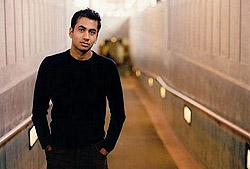
Kal, you easily qualify as one of the very few Indian-American actors of Gujarati heritage working in Hollywood today. But is this honor also a burden sometimes? Kal Penn - "I don’t see it as an honor nor a burden. The race or ethnicity you are born into is quite honestly arbitrary. I’m more proud of things like family history & ties of that sort (which incidentally is what the 'Namesake' is all about). I’m particularly proud of my grandparents, who were active in the Gandhian independence movement in India, and my parents, who sacrificed so much to become Americans."
With regard director Mira Nair’s version of ‘The Namesake,’ to prepare yourself did you perhaps read Jhumpa Lahiri's much-praised 2003 best seller before stepping in front of the camera? "Of course! I had read the book a few years before the film was made, and that was actually the impetus behind pursuing the film project so aggressively. Jhumpa has created such awesome and intimate details about Gogol’s life and who he is, it was a treat to have that manuscript to refer to every day as we shot the film."
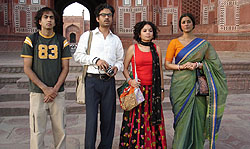
The movie's governing metaphor is bridges - like the 59th Street Bridge in New York, like the Howrah Bridge in Calcutta, indeed like your own character Gogol, a human TriBoro if you will linking India, America, and Russia – but are there times in your personal life that you feel much the same way about the work that you do and the heritage that you belong to? "I think that the past near-decade has been full of examples of just how small our world has become: between world trade, globalization, terrorism, financial crises, and foreign aid, we are no longer just isolated groups of people living in a huge world. The lines between ethnicity, religion, and nationalism continue to become blurred – I love being an artist at a time like this, and having the opportunity to tell some of these new stories."
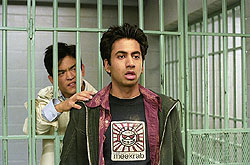
In "Harold and Kumar Go to White Castle" you showed us the stoner comic mind of your generation, but in this you emerge as a dramatic actor of wit. In acting terms is there a defining moment on set when you realize that the project you are undertaking is more than the sum of its many parts? That, perhaps, what you are doing at that moment is going to either allow you to sink or swim within the business? And if so, at what point during the filming of ‘The Namesake’ did this moment of clarity strike you and in what way? "Nope. I view filmmaking as an artistic process, so there isn’t really one singular defining moment in that sense. A lot of art also rests upon interpretation, so many things are left to the audience. I think that question might be better suited to them – and I’d be curious what they have to say."
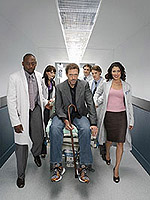
With regard your ongoing work on tv's 'House’ as Kutner, it’s time to reveal a secret: when does House cut you and for what reason?! Also, how was it to learn all that medical jargon as it seems like some unbelievably deep endless gibberish at the best of times to us laymen! "Nice try. If I told you, it would ruin the season for the audience! As far as the medical jargon, I love learning about the things my characters know, so I enjoy the medical research we need to do for each episode. Our writers (who I hope get a fair contract and come back to work from the strike soon) are truly brilliant. The things they come up with are so great to play with each week!"
Is it true that you were offered a role in Robert Rodriguez’s “Planet Terror” but had to turn it down due to your commitment to ‘The Namesake’? "I was originally cast in Tarantino’s film, not Rodriguez’. I’m a huge fan of both guys, and I respect them immensely. Quentin is a great guy, and has been particularly supportive of “Harold and Kumar”, so I was particularly looking forward to working with him. Lots of times when you’re juggling different projects, shoot dates overlap, which is what happened with his film. Tarantino had to recast the role because of that conflict, but I’m hoping to work with him again on something."
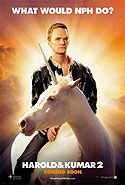
Please tell us more about your upcoming film ‘Harold & Kumar Escape Guantanamo Bay’ and what fans of the original can expect more of this time around? "I hope that “Harold and Kumar 2” gives our fans what they’ve been waiting for. This time around, the stakes are so much higher – Harold and Kumar are mistaken for terrorists and have to clear their names. There are some awesome and unexpected cameos, and of course Neil Patrick Harris is back and bigger than before."
Finally, I find something you once said about your role on TV’s “24” very interesting. You said that you had a ‘huge political problem with the role’ as it was ‘essentially accepting a form of racial profiling.’ Further more you said that you thought it was ‘repulsive’ but that it was the first chance you had had to ‘blow stuff up and take a family hostage’! Now, I understand that as an actor you have to take your opportunities however and whenever they are handed to you, but to place your heartfelt, personal beliefs on the back burner for Hollywood seems like such an extreme decision. Do you now regret that decision to do “24” because of that reasoning, or do you still stand behind your choice and the role undertaken therein? "Unfortunately, what you read was a very, very small portion of an interview that was taken almost entirely out of context. Nothing was meant to be “extreme” as you suggested, so have no fear!"
"I was actually trying to make the point that in art, especially politically-relevant projects, peoples’ emotions often bring out some great discussions. Among those discussions with regard to my role on “24” are issues like national security, racial profiling, and so on. These are issues that are very real to America today, and there is a lot of debate on handling these in the most effective manner. I was trying to acknowledge the importance of those discussions and say that if people do find these depictions to be repulsive for some reason, or if they approve, they should engage in actual political discourse: writing letters to congress, getting involved in church, temple, or mosque groups, voting, and so on."
"It’s so easy for us to sit back and argue about a fictitious tv show, but hopefully people take the extra step to participate in real-world issues. As far as my own beliefs vs a character’s beliefs: I don’t really see any major conflicts there. If anything, it’s more interesting (and much preferred) to play a role that’d the exact opposite of me in real life."
Thank you for speaking with us today and we wish you well for the future "Thank you!"
'The Namesake' DVD Purchase Link
'The Namesake' Official Website
Back To Archives

